This may come as a surprise to many of you, but I have never been to a prison.
So when our photographer Claire and I were invited to Hydebank Wood College in Belfast to learn about their agricultural rehabilitation programme, I had images in my mind of The Shawshank Redemption or The Green Mile – barred doors, damp rooms with dripping pipes and threatening-looking guards.
I wasn’t expecting to be greeted with nature (Hydebank, called a “secure college” is located within a beautiful pocket of forest outside the city), colourful art, flowers, freshly baked cookies and – yes – almost as many animals as inmates.
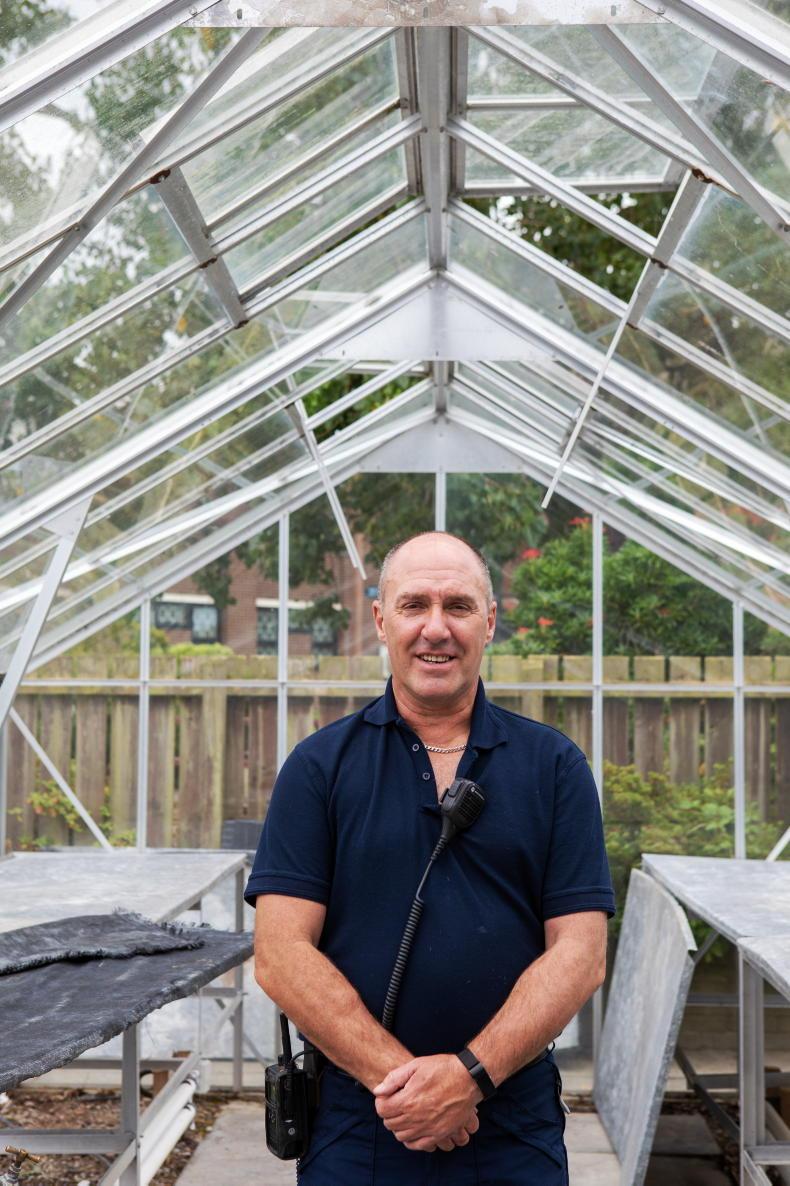
Richard Graham manages the grounds of Hydebank and introduced the Border Leicester rehabilitation programme. \ Claire Nash
I was pleased to see so many smiles on our visit – from the friendly staff to the groups of residents (known as “students”) out working, to the resident priest. I left feeling encouraged and, not for the first time, proud of Irish agriculture’s ability to bring people from such diverse walks of life together.
Hydebank Wood College
Hydebank is home to 60 young men. All have committed crimes of varying severity. Without forgetting these crimes or disrespecting the victims in any way, the staff at Hydebank – most notably Richard (Ricky) Graham and Michele McElnea, with support from their superiors at the Northern Ireland Department of Justice – have created a safe and innovative space to enable the rehabilitation of their students.
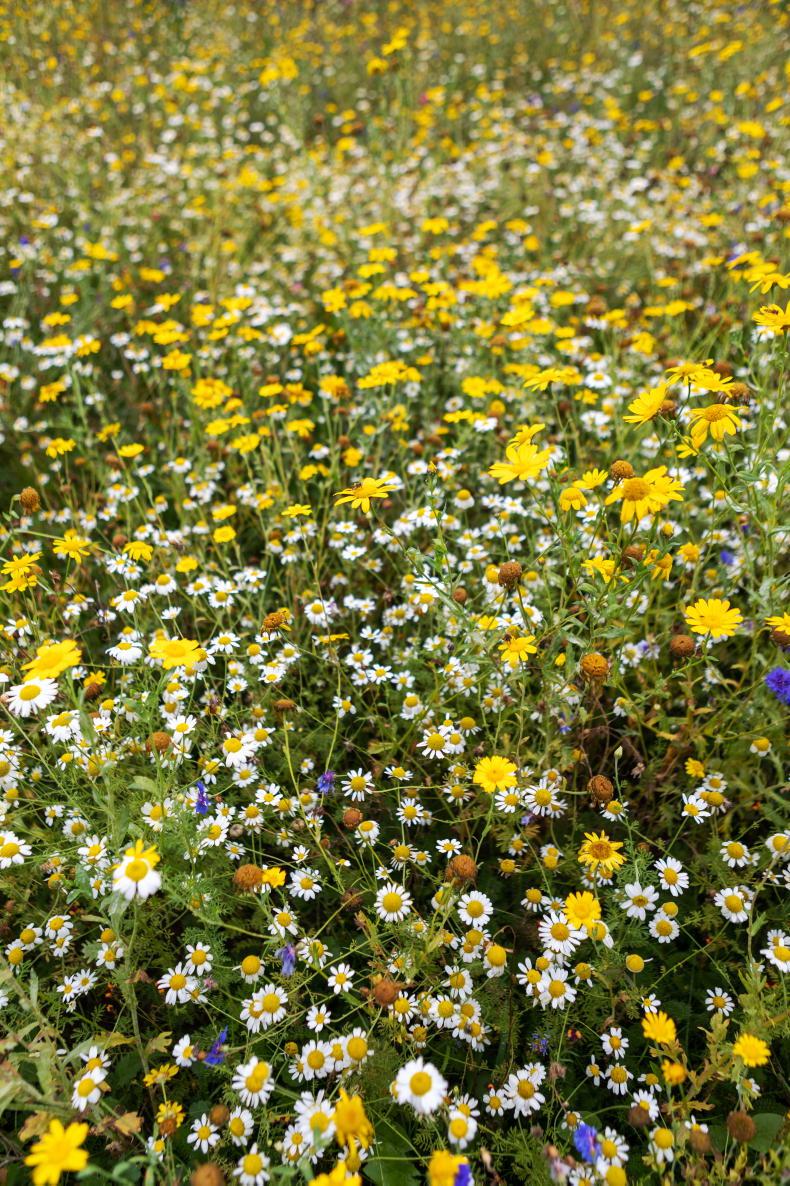
At Hydebank, there are several pollinator beds set up around the campus. They also keep bees. \ Claire Nash
During lockdown, the college was under a strict no-visitors rule, which meant they were successful in keeping COVID-19 outside the walls. Irish Country Living asks Michele (who is activities and virtual visits manager at Hydebank) if the no-visitors rule had a negative impact on the students’ mental health.
“Not at all – in fact, we introduced regular Zoom visitation calls with family members which worked out really well,” she says.
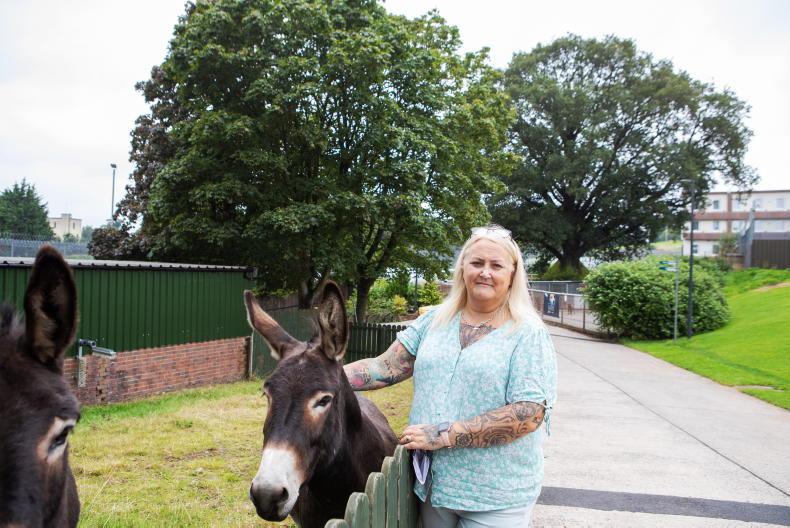
Michele McElnea is activities and virtual visits manager at Hydebank. \ Claire Nash
“So well, in fact, that we’ve kept the Zoom calls going. The students are able to book a time with the laptop and I arrange the Zoom meetings in advance. This has worked especially well for those whose parents live in other regions – it’s extended their ability to communicate with loved ones.”
Basic needs
When I was in secondary school, I remember learning about Maslow’s Hierarchy of Needs – the things we need in our lives to flourish as humans and a society.
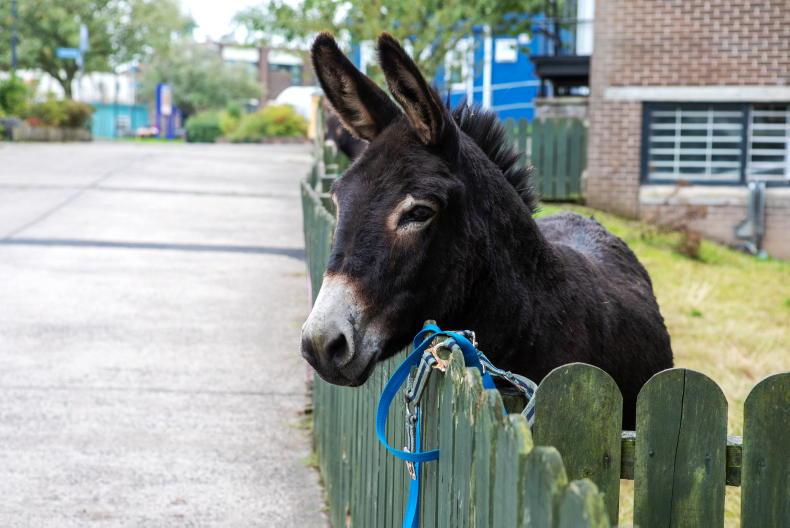
Hydebank keeps two rescue donkeys on campus. \ Claire Nash
Our most basic needs are for shelter, clothes, food and air. Once those needs are met, we can begin to think about safety (emotional and physical security), followed by love and social belonging. Michele says many of the students at Hydebank have grown up lacking these basic needs, which meant they never considered in what kind of work in which they might be skilled. This is part of the reason their activities programme has been so successful.

Hydebank is not your typical secure college; the campus is full of colour and life. \ Claire Nash
“Here, you may be incarcerated, but there is a roof over your head, clean clothes and three meals every day,” she explains. “Once those basic needs have been met, we can start to work with students on the type of work they might enjoy or want to learn more about. This is really where Ricky’s expertise in farming came into play, with our Border Leicester rehabilitation programme.”
Border Leicesters
“I live on a farm at home; I come from a farming background,” Ricky, who manages the grounds of the college, explains.
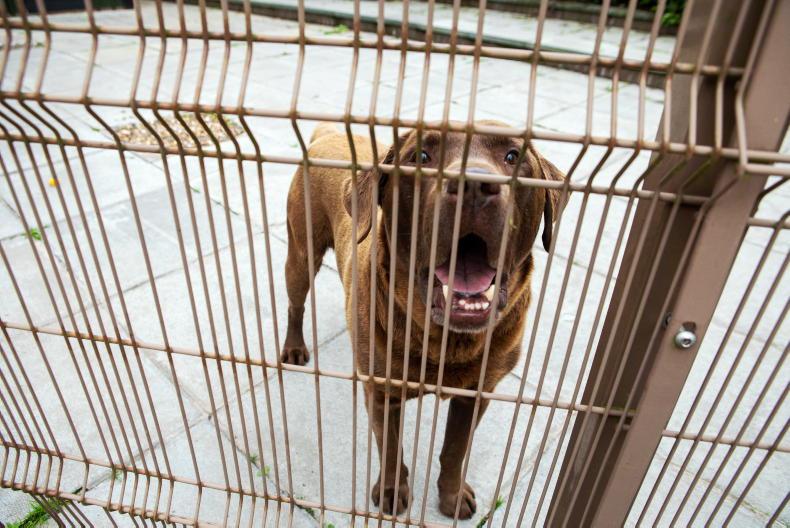
Hydebank keeps two therapy dogs on campus to help with student rehabilitation. \ Claire Nash
“We always kept sheep and the opportunity came up to bring some animals to Hydebank. We started off with a few goats and then got two donkeys. We found the students – even if they had never seen a farm animal in their life – really responded to the hands-on work involved in rearing and caring for the animals.”
Eventually, the opportunity came for several pedigree Border Leicester sheep to reside in the college. With administrative help from Michele and funding from the governor (at the time Austin Treacy), Ricky trained the students in animal husbandry.

One of Hydebank's pedigree Border Leicester ewes. \ Claire Nash
“They would be watching [the sheep] from their rooms and sometimes they’d shout for us to go in and check on them,” Ricky says. “Sure enough, on occasion there were lambs we weren’t expecting.”
The art of showing pedigree sheep
Interested students were trained in showing the pedigree sheep and started attending different shows around the area (including the prestigious Balmoral Show), but they were also expected to care for the sheep at all times; even sleeping in a hut near the shed during lambing season.
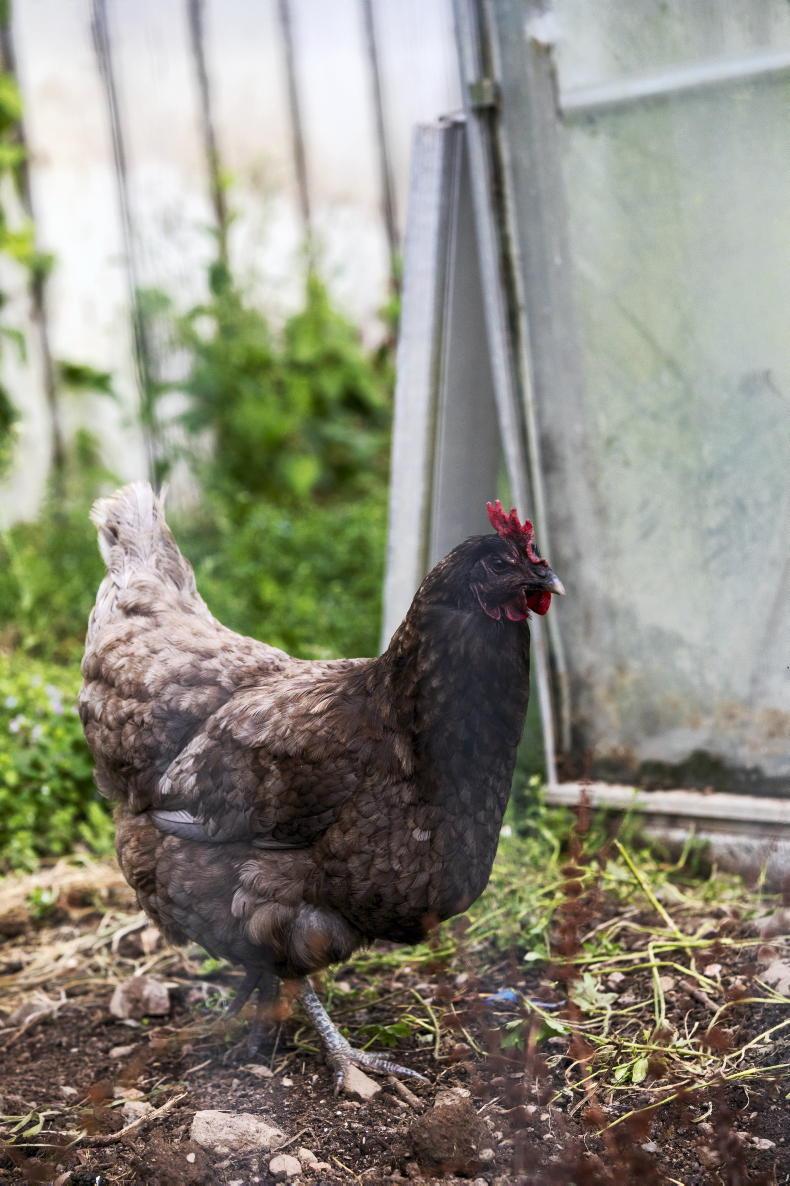
The students also care for laying hens and they collect eggs each day. \ Claire Nash
“Through this programme, the boys learn so much about the animals, but they also learn a great deal about themselves,” Ricky says. “Farming isn’t easy – many students come from an urban area and wouldn’t know they had this kind of hard work ethic in them. They’re delighted then, when they succeed in something or we win a ribbon.”
Anonymity assured
When the students come through the doors at Hydebank, Ricky and Michele tell us that no one mentions their crime.
“It’s one of the rules – you just don’t talk about it,” Michele says. “I don’t, Ricky doesn’t, the residents don’t.”
Likewise at shows, the young men showing the sheep are anonymous. The average spectator doesn’t know their past. This is important, because, while Ricky and Michele stress the importance of never disrespecting a victim of a crime, this also might be the first time in a student’s life where they are considered equal to other professionals. The sense of pride and achievement can do wonders for their overall rehabilitation.
“This programme has succeeded in so many ways,” says Michele, “but the actual proof of it is when these young men have served their time and are able to go successfully back into society. They may not go into an agricultural job, but they are better able to find steady work because they have more of a belief in their abilities.”
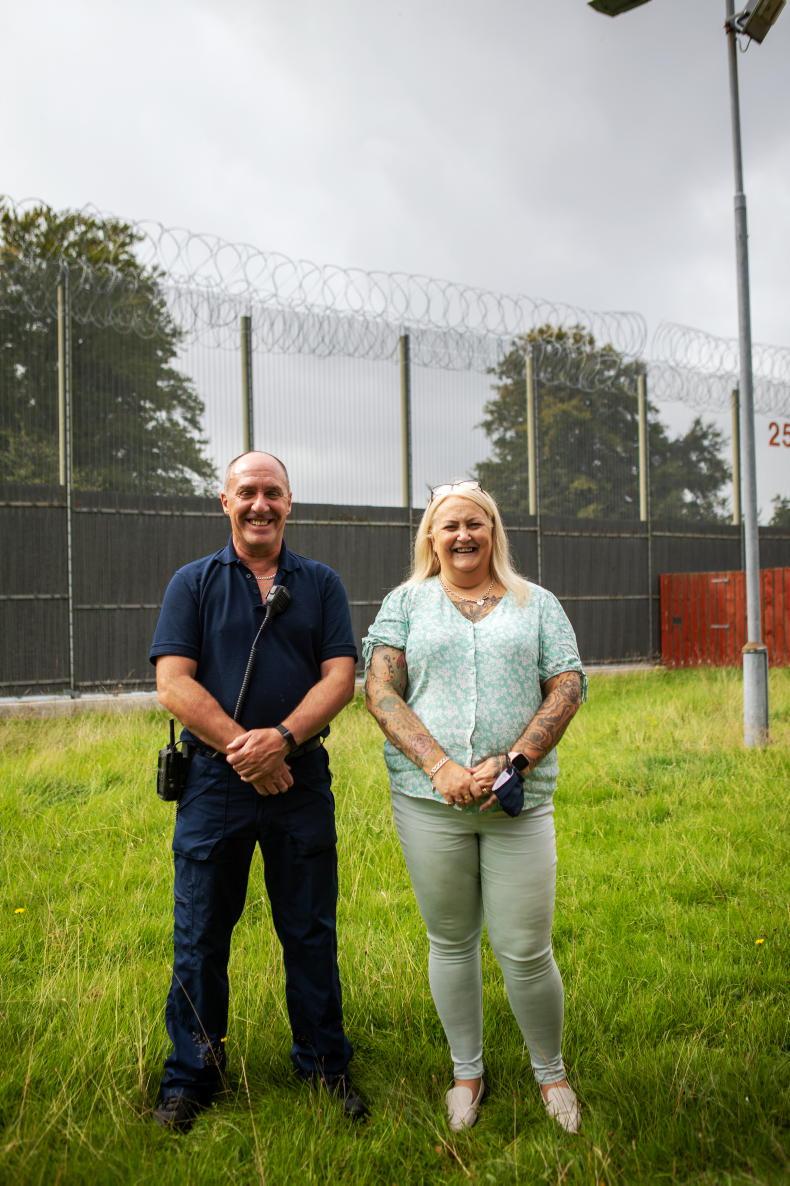
Michele and Ricky work together to provide encouragement and interesting projects to help with students' rehabilitation. \ Claire Nash
Multi-faceted approach
Sheep aren’t the only learning opportunity at Hydebank. The facility also has polytunnels where students grow flowers from seed each year to make hanging baskets, which they sell to the local community. They also make jam and chutney to sell. There is also a learning campus, which gives students the chance to adopt a variety of skills; from using an espresso machine to giving someone a haircut.

The college also keeps other breeds of sheep . \ Claire Nash
But as working with animals has proven therapeutic effects; both Michele and Ricky see a meaningful change in the students from the time the walk through the doors at Hydebank to the time they leave.
“[Current] Governor [Richard] Taylor really believes in us and believes in what we have on offer here for the boys,” Ricky says. “We get a lot of support, and also funding, from above because this kind of system just works.”
It works for the employees of Hydebank, as well.
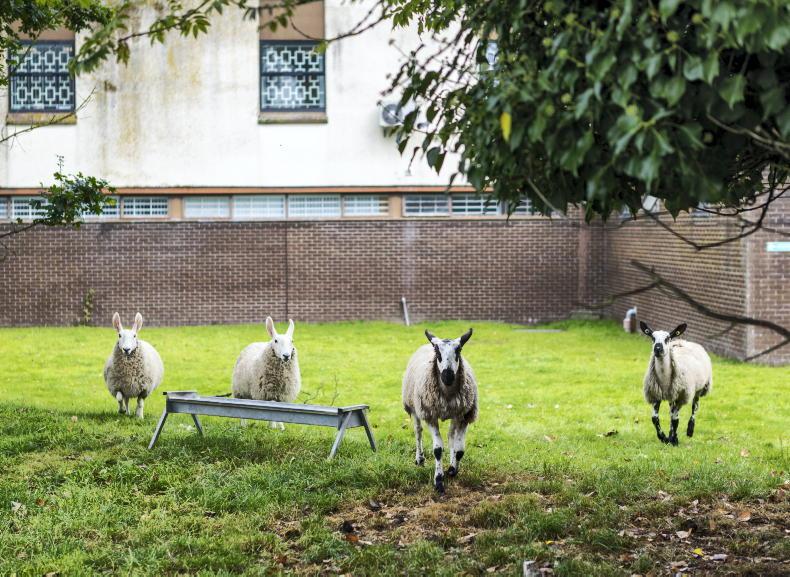
The Border Leicester reabilitation programme at Hydebank College has been hugely successful. \ Claire Nash
Pride in work
Michele is extremely fond of their sanctuary donkeys and can often be found giving them treats and hugs when she has a free minute. 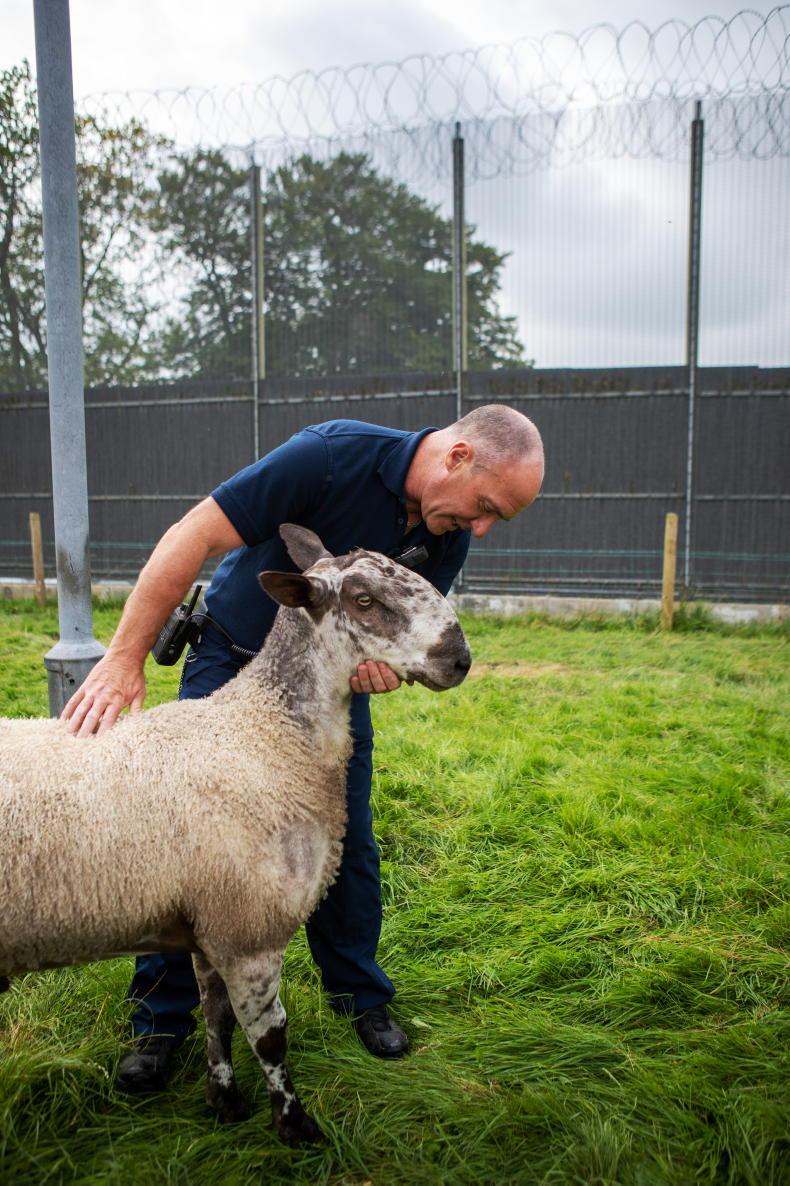
Down from the donkeys, there are therapy dogs for the students. Chickens and a goat complete the animal menagerie; while wildflower beds have been planted for pollinators and some bee hives have been brought in.
And Ricky? This year, he was especially proud of the students working under his tutelage, and of their pedigree Blueface Leicester ram, which placed second in his class at the show in Armoy and sold for £820. One of his progeny was champion of the show and made £1,360.
Read more
A new route to market for Irish wool?
A product of their environment
This may come as a surprise to many of you, but I have never been to a prison.
So when our photographer Claire and I were invited to Hydebank Wood College in Belfast to learn about their agricultural rehabilitation programme, I had images in my mind of The Shawshank Redemption or The Green Mile – barred doors, damp rooms with dripping pipes and threatening-looking guards.
I wasn’t expecting to be greeted with nature (Hydebank, called a “secure college” is located within a beautiful pocket of forest outside the city), colourful art, flowers, freshly baked cookies and – yes – almost as many animals as inmates.

Richard Graham manages the grounds of Hydebank and introduced the Border Leicester rehabilitation programme. \ Claire Nash
I was pleased to see so many smiles on our visit – from the friendly staff to the groups of residents (known as “students”) out working, to the resident priest. I left feeling encouraged and, not for the first time, proud of Irish agriculture’s ability to bring people from such diverse walks of life together.
Hydebank Wood College
Hydebank is home to 60 young men. All have committed crimes of varying severity. Without forgetting these crimes or disrespecting the victims in any way, the staff at Hydebank – most notably Richard (Ricky) Graham and Michele McElnea, with support from their superiors at the Northern Ireland Department of Justice – have created a safe and innovative space to enable the rehabilitation of their students.

At Hydebank, there are several pollinator beds set up around the campus. They also keep bees. \ Claire Nash
During lockdown, the college was under a strict no-visitors rule, which meant they were successful in keeping COVID-19 outside the walls. Irish Country Living asks Michele (who is activities and virtual visits manager at Hydebank) if the no-visitors rule had a negative impact on the students’ mental health.
“Not at all – in fact, we introduced regular Zoom visitation calls with family members which worked out really well,” she says.

Michele McElnea is activities and virtual visits manager at Hydebank. \ Claire Nash
“So well, in fact, that we’ve kept the Zoom calls going. The students are able to book a time with the laptop and I arrange the Zoom meetings in advance. This has worked especially well for those whose parents live in other regions – it’s extended their ability to communicate with loved ones.”
Basic needs
When I was in secondary school, I remember learning about Maslow’s Hierarchy of Needs – the things we need in our lives to flourish as humans and a society.

Hydebank keeps two rescue donkeys on campus. \ Claire Nash
Our most basic needs are for shelter, clothes, food and air. Once those needs are met, we can begin to think about safety (emotional and physical security), followed by love and social belonging. Michele says many of the students at Hydebank have grown up lacking these basic needs, which meant they never considered in what kind of work in which they might be skilled. This is part of the reason their activities programme has been so successful.

Hydebank is not your typical secure college; the campus is full of colour and life. \ Claire Nash
“Here, you may be incarcerated, but there is a roof over your head, clean clothes and three meals every day,” she explains. “Once those basic needs have been met, we can start to work with students on the type of work they might enjoy or want to learn more about. This is really where Ricky’s expertise in farming came into play, with our Border Leicester rehabilitation programme.”
Border Leicesters
“I live on a farm at home; I come from a farming background,” Ricky, who manages the grounds of the college, explains.

Hydebank keeps two therapy dogs on campus to help with student rehabilitation. \ Claire Nash
“We always kept sheep and the opportunity came up to bring some animals to Hydebank. We started off with a few goats and then got two donkeys. We found the students – even if they had never seen a farm animal in their life – really responded to the hands-on work involved in rearing and caring for the animals.”
Eventually, the opportunity came for several pedigree Border Leicester sheep to reside in the college. With administrative help from Michele and funding from the governor (at the time Austin Treacy), Ricky trained the students in animal husbandry.

One of Hydebank's pedigree Border Leicester ewes. \ Claire Nash
“They would be watching [the sheep] from their rooms and sometimes they’d shout for us to go in and check on them,” Ricky says. “Sure enough, on occasion there were lambs we weren’t expecting.”
The art of showing pedigree sheep
Interested students were trained in showing the pedigree sheep and started attending different shows around the area (including the prestigious Balmoral Show), but they were also expected to care for the sheep at all times; even sleeping in a hut near the shed during lambing season.

The students also care for laying hens and they collect eggs each day. \ Claire Nash
“Through this programme, the boys learn so much about the animals, but they also learn a great deal about themselves,” Ricky says. “Farming isn’t easy – many students come from an urban area and wouldn’t know they had this kind of hard work ethic in them. They’re delighted then, when they succeed in something or we win a ribbon.”
Anonymity assured
When the students come through the doors at Hydebank, Ricky and Michele tell us that no one mentions their crime.
“It’s one of the rules – you just don’t talk about it,” Michele says. “I don’t, Ricky doesn’t, the residents don’t.”
Likewise at shows, the young men showing the sheep are anonymous. The average spectator doesn’t know their past. This is important, because, while Ricky and Michele stress the importance of never disrespecting a victim of a crime, this also might be the first time in a student’s life where they are considered equal to other professionals. The sense of pride and achievement can do wonders for their overall rehabilitation.
“This programme has succeeded in so many ways,” says Michele, “but the actual proof of it is when these young men have served their time and are able to go successfully back into society. They may not go into an agricultural job, but they are better able to find steady work because they have more of a belief in their abilities.”

Michele and Ricky work together to provide encouragement and interesting projects to help with students' rehabilitation. \ Claire Nash
Multi-faceted approach
Sheep aren’t the only learning opportunity at Hydebank. The facility also has polytunnels where students grow flowers from seed each year to make hanging baskets, which they sell to the local community. They also make jam and chutney to sell. There is also a learning campus, which gives students the chance to adopt a variety of skills; from using an espresso machine to giving someone a haircut.

The college also keeps other breeds of sheep . \ Claire Nash
But as working with animals has proven therapeutic effects; both Michele and Ricky see a meaningful change in the students from the time the walk through the doors at Hydebank to the time they leave.
“[Current] Governor [Richard] Taylor really believes in us and believes in what we have on offer here for the boys,” Ricky says. “We get a lot of support, and also funding, from above because this kind of system just works.”
It works for the employees of Hydebank, as well.

The Border Leicester reabilitation programme at Hydebank College has been hugely successful. \ Claire Nash
Pride in work
Michele is extremely fond of their sanctuary donkeys and can often be found giving them treats and hugs when she has a free minute. 
Down from the donkeys, there are therapy dogs for the students. Chickens and a goat complete the animal menagerie; while wildflower beds have been planted for pollinators and some bee hives have been brought in.
And Ricky? This year, he was especially proud of the students working under his tutelage, and of their pedigree Blueface Leicester ram, which placed second in his class at the show in Armoy and sold for £820. One of his progeny was champion of the show and made £1,360.
Read more
A new route to market for Irish wool?
A product of their environment


















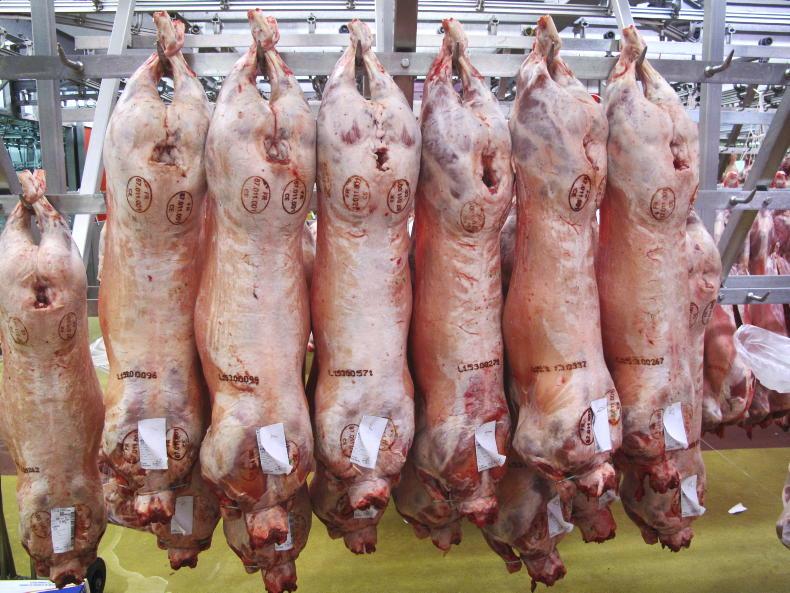

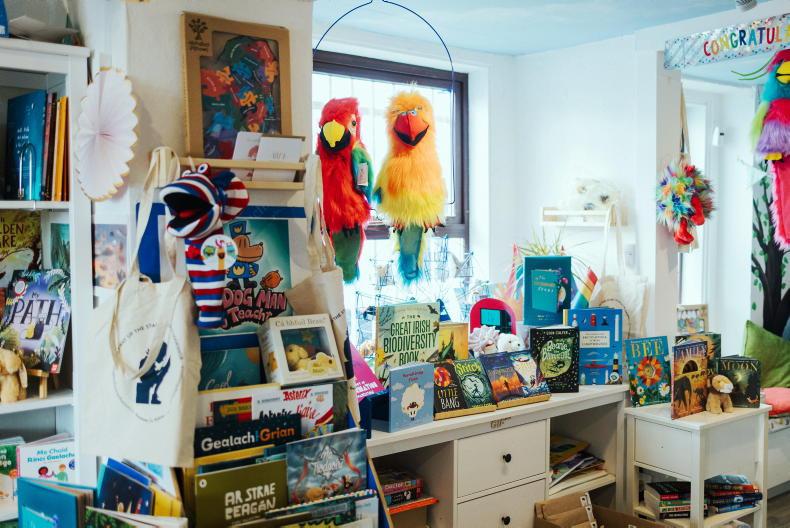

SHARING OPTIONS